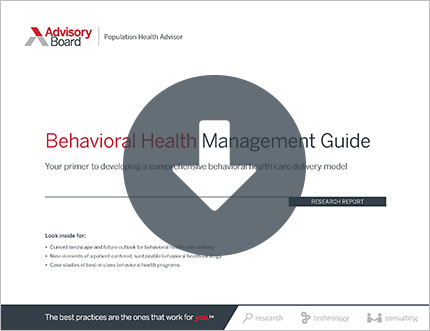Auto logout in seconds.
Continue LogoutRead Advisory Board's take: How can providers connect patients to evidence-based support platforms?
It's becoming increasingly common for patients with rare diseases or cancer gene mutations to turn to Facebook groups for emotional support. But these groups often face privacy and financial concerns, Sarah Zhang writes for The Atlantic.
The emotional support groups on Facebook
According to Facebook co-founder, Chair, and CEO Mark Zuckerberg, the social media platform began more heavily emphasizing groups in 2017 in an effort to "give people the power to build community and bring the world closer together." A number of these groups are "closed," which means the public can find them, but only members can see their content, while others are "secret," which means they are findable by invite only.
While these groups cover almost every imaginable topic, a sizeable subset focus on the emotional needs of those facing medical and personal challenges. These range from broad areas like diabetes and addiction support to hyper-specific topics like connecting families of people with the NGLY1 deficiency—an extremely rare condition that affects just a few dozen people worldwide.
Matt Might, a member of the NGLY1 group whose son has the deficiency, said, "This is pretty standard now. You would be hard-pressed to find a rare disease without a group."
Other groups, like one called the BRCA Sisterhood, whose members all have the BRCA1 mutation which can raise their risk of breast cancer to over 70%, has grown to over 10,000 members, Zhang writes.
Andrea Downing, a member of the BRCA Sisterhood, said, "For people searching for support, [Facebook] is a one-stop shop." She added that the women in the BRCA Sisterhood group were a "lifeline," adding, "I did not know anybody who was going through the same experience. When you can't even talk to your own friends and family about what you're going through, just living with that is really hard."
The problems that can arise from these groups
While Facebook groups can offer valuable support, patient advocates have raised privacy and other concerns, Zhang writes. For example, posts in the groups are subject to the site's default settings, such as algorithms that favor popular content over more recent content on pages. This can leave new members at risk of "algorithmic ghosting," a phenomena that occurs when a question that's been popular in the past is more visible than an unanswered recent question, Zhang writes.
There's also significant potential for abuse from people outside the groups, Zhang writes. In March, Downing of the BCRA Sisterhood group discovered an extension to Google Chrome that allowed marketers to look through the membership lists of closed Facebook groups—threatening the privacy of members in the group. Working with a security researcher, Downing was able to submit the information to Facebook and send a cease-and-desist order to the extension's developers, Zhang writes.
Similarly, in November 2017, The Verge investigated a group called Affected by Addiction, and found the group's founder was a marketer for treatment centers and that he had mined the group for potential patients without disclosing his ties.
In other instances, members of groups have been harassed when groups were suddenly made public. In July, a report from Wired recounted how a Facebook group for sexual-assault survivors had suddenly been changed by administrators to a group for sharing erotica, which led to a number of members being harassed by online trolls.
Stories like these made Downing worry about what could happen to the members of the BRCA Sisterhood, Zhang writes. She had considered removing the group entirely, but that would also mean deleting 10 years' worth of posts and losing the community. "[Facebook is] the only place that these groups can go," she said. Might, of the NGLY1 group, agreed. "The problem is Facebook groups are not the best way. It's the only way," he said (Zhang, The Atlantic, 10/26).
Advisory Board's take


Tomi Ogundimu, Practice Manager, Population Health Advisor and Petra Esseling, Consultant, Population Health Advisor
The number, size, and influence of these Facebook communities and support groups clearly indicate that patients are craving emotional support for their health care needs. While many are able to tap into these online groups, local support groups, or afford recurring expert counseling services, many others are not so lucky. In addition, and as the article mentions, these online groups can be rife with misinformation, or worse, have marketing ties that are not clearly disclosed.
Providers can play an important go-between role to counter this problem. We've found that, in many markets, there's an underutilized opportunity for providers to connect patients seeking self-management support with validated, evidence-based virtual support resources, especially for behavioral health needs. These resources can not only improve patient satisfaction and outcomes, but can also return a strong ROI for the provider organizations that invest in them.
“There's an underutilized opportunity to connect patients seeking self-management support with validated, evidence-based resources”
Whether Atrium Health, Montefiore Health System, Partners Healthcare, or Kaiser Permanente, organizations are increasingly connecting patients with evidence-based, virtual self-care platforms to enhance self-management and extend the reach of their care team.
Atrium Health, a nonprofit system in North and South Carolina, connects patients with myStrength, a mobile and web-based self-care platform for individuals with common behavioral health needs. myStrength also partners with 23 Missouri community behavioral health providers. A state-wide claims analysis there has shown that patients with access to the platform saved $382 per beneficiary per year —resulting in a 6.9 ROI.
Other systems partner with app makers to help connect patients with virtual support. New York-based Montefiore Health System recently conducted a 238-patient pilot with Valera Health, creators of a smartphone app to improve the treatment of mental health problems. Patients can connect with their care managers through the platform, engage in secure text messaging, and benefit from educational content and appointment reminders. Within a year of the partnership, Montefiore saw improved symptoms and remission rates of anxiety and depression, significantly higher patient engagement, and their care managers were able to take on higher workloads.
But not all apps out there will be properly vetted and helpful for patients. To choose a partner for your virtual health program, make sure you ensure that:
- The product has been tested for its intended audience and in real health care settings;
- Medical health professionals in the app's field of focus work for the company or contributed to the development process; and
- You are careful with quality control and choose a tool with an intuitive design, evidence-based techniques, data privacy, and that is engaging and customizable.
To learn more about how to integrate patient support into your delivery model, be sure to download our Behavioral Health Management Guide, which outlines nine program models to address the needs of patients with behavioral health conditions.
Need help getting the funding for these new initiatives? Register for our webconference on Wednesday, December 5th to learn about Five Population Health Fundraising Strategies Hiding in Plain Sight.
Don't miss out on the latest Advisory Board insights
Create your free account to access 1 resource, including the latest research and webinars.
Want access without creating an account?
You have 1 free members-only resource remaining this month.
1 free members-only resources remaining
1 free members-only resources remaining
You've reached your limit of free insights
Become a member to access all of Advisory Board's resources, events, and experts
Never miss out on the latest innovative health care content tailored to you.
Benefits include:
You've reached your limit of free insights
Become a member to access all of Advisory Board's resources, events, and experts
Never miss out on the latest innovative health care content tailored to you.
Benefits include:
This content is available through your Curated Research partnership with Advisory Board. Click on ‘view this resource’ to read the full piece
Email ask@advisory.com to learn more
Click on ‘Become a Member’ to learn about the benefits of a Full-Access partnership with Advisory Board
Never miss out on the latest innovative health care content tailored to you.
Benefits Include:
This is for members only. Learn more.
Click on ‘Become a Member’ to learn about the benefits of a Full-Access partnership with Advisory Board
Never miss out on the latest innovative health care content tailored to you.

